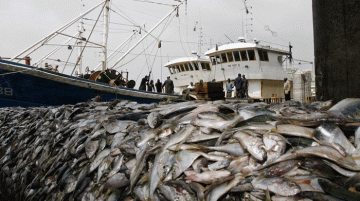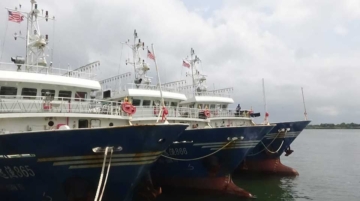
For more than five years, Swarno Lumbangaol has been trying to preserve the Batak fish (Neolissochilus thienemannie) – an endangered species found only in Indonesia’s Lake Toba and its connected rivers – in his backyard pond.
The task has proven to be very difficult.
“The Batak fish requires swift water currents, while my pond has calm water flow. That’s why their growth is slow,” said Lumbangaol when CGSP visited his home.
Lumbangaol is a pioneer of the Batak fish conservation in his village. In 2015, upon returning to his village from working abroad, Lumbangaol wanted to start a fishery business. He remembered that as a child, he used to catch the Batak fish in the Aek Silang River.
But, now, the fish have become rare. Lumbangaol said he struggled in obtaining the Batak fish seeds from the river for breeding.
Lumbangaol is a resident of Londut Village, Martodo, who lives near the Chinese-owned Aek Silang mini-hydropower plant’s dam site. The mini-hydropower plant, which started operating in 2016, is a joint venture between Chinese firm Yu Zhou Tianyuan Group and local energy company Bakara Energi Lestari.

The $30 million facility harnesses the Aek Silang River, which flows into Lake Toba, one of Southeast Asia’s largest lakes. The Chinese company that built the dam, Yu Zhou Tianyuan, touted the dam as “the first example of Chinese private enterprises investing in the small and medium hydropower industry in Indonesia” and as part of China’s Belt and Road strategy.
While the Aek Silang mini-hydropower plant does produce clean energy, the facility is also adversely impacting the surrounding natural ecosystem — particularly the region’s fragile Batak fish population.

“The Batak fish thrives in fast-flowing currents, swimming against the tide. Changes can disrupt the fish’s reproductive cycle, from spawning to hatching,” Desrita, a lecturer in Water Resources Management at the University of North Sumatra (USU), told CGSP. “Over time, this species faces the risk of extinction,” she said.
Batak fish has long been a prized resource for local indigenous communities as an integral part of their diet, rituals, and ceremonies. Traditionally, all ceremonial activities would involve the use of the fish, marking important milestones in one’s life starting from their birth to death.
For instance, during traditional weddings and other festive occasions, the Batak tribe prepares various fish dishes as symbols of prosperity, abundance, and good luck. This particular species of fish is believed to bring blessings and unity to the community.
“In Batak mythology and spirituality, fish is also revered and considered sacred. It is believed to symbolize fertility, rebirth, and protection”, said Robert Sibarani, professor and anthropologist at the University of North Sumatra. This is why the tribe’s role in preserving the fish has been ingrained for centuries.
Now, in the Aek Silang River, two hydroelectric dams have been built: the Bakara-Yu Zhou and the Hutaraja developed by local firm Humbahas Bumi Energi.
These mini-hydropower plants are now being built across the country to meet Indonesia’s steadily rising demand for electricity and are part of the government’s plan to achieve a 23% renewable energy mix in 2025 with net zero emission by 2060.
Indonesia’s renewable energy potential nears 418 gigawatts, with hydropower amounting to 75 gigawatts. According to the National Development Planning Agency (Bappenas), Indonesia would need up to $167 billion to achieve its energy goals.
China has again shown to be a willing partner to help Indonesia, investing in various hydropower projects, including the development of the $17.8 billion Kayan Cascade project in North Kalimantan. The Kayan Cascade, a part of China’s Belt and Road Initiative, includes building a series of dams along the Kayan River with a combined generating capacity of 9 gigawatts. Sumitomo has recently joined the project.
“Renewable energy should be encouraged, but such massive developments often risk overlooking social and environmental impacts for local communities”, said Hengky Manalu of the Indigenous Peoples Alliance of the Archipelago Tano Batak.
“If the ecosystems of the lake and river are damaged, not only will the Batak fish disappear, but the culture will also slowly vanish.”
Hengky Manalu of the Indigenous Peoples Alliance of the Archipelago Tano Batak
Earlier this year, in February, Indonesia hosted the F1 Powerboat World Championships in Balige, North Sumatra. Aek Silang mini-hydropower plant, along with the Hutaraja facility, supplied the electricity for the high-profile international event. Organizers were proud to call the event “supporting the global sustainable green agenda”, and the government claimed the use of renewable energy for it as a success.
What was not reported, however, was that local residents had to endure widespread power outages in the surrounding areas of Bakkara during the event.
The local communities have endured other effects for much longer. On November 20, 2017, a flash flood struck the Humbang Hasundutan region in North Sumatra, causing significant damage to homes and rice fields in the affected areas. Residents believed that it was caused by the power plants. Though there were no casualties, 134 homes and agricultural lands along the riverbanks were damaged. About 12 hectares of farmland were affected by the flood, bringing financial losses for the farmers.
Yu Zhou Tianyuan and Bakara Energi declined to comment.
Renewable energy infrastructure must be built with care, experts said. While Lake Toba and its rivers are ideal locations for hydropower facilities, developers must remember that they are also an ancestral heritage for people in North Sumatra, an ecosystem that plays a critical role in preserving biodiversity and directly shapes the culture of the surrounding communities.
“If the ecosystems of the lake and river are damaged, not only will the Batak fish disappear, but the culture will also slowly vanish,” said Hengky.
Barita News Lumbanbatu is an Indonesian writer, public advocate, and environmentalist.








